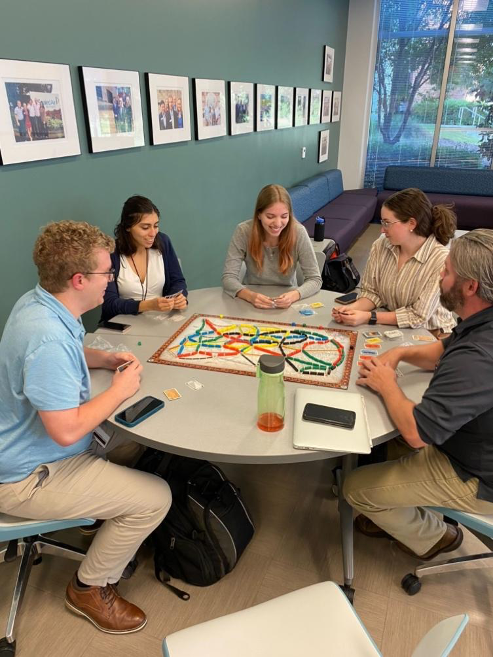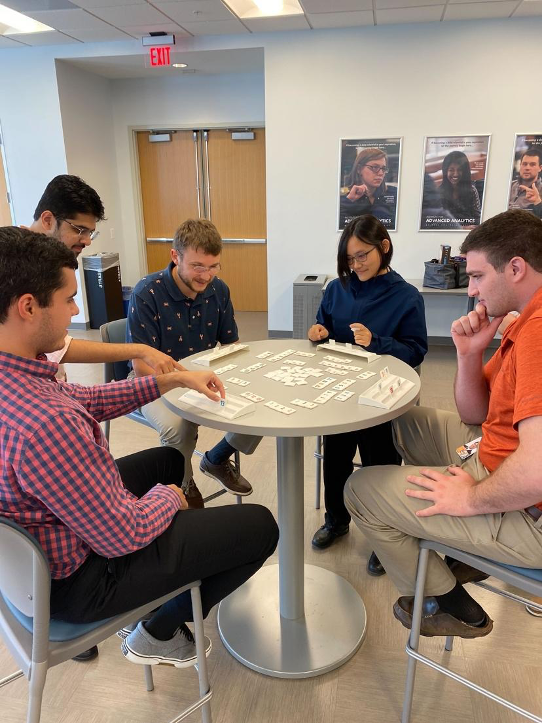You might know how hard the graduate students at the Institute work, but you may not realize how hard we play.
We have almost 100 channels for different hobbies and interests on Slack. On these channels, we facilitate academic discussions, tell jokes, and plan activities.
One of these activities is a regularly-held board game night hosted by the one and only Brandon Barbour, System Administrator. Board game nights are an excellent way for students to have an evening to relax from the stresses of school, experience how probabilities are used in games, and get to know each other on a personal level.

As we go through the rigors of this program, we need to find ways to take our minds off the stress of school. For me, game nights have been one of the best ways to do that because I really can kick back and focus on the game. You see, I’m a competitive person and want to find the most optimal strategies to get more points or put the odds in my favor. It is great to put myself in that state of mind, where I’m focusing on something other than evaluating time series forecasts, fixing bugs in my code, or practicing my presentation skills.
As analysts, we love to find optimal ways to win strategic games. A few of our favorite games include Wingspan, Ticket to Ride, Rummikub, Phase 10, Carcassonne, and many others. Board games fall along a spectrum from 100% chance, like the simple card game called War, to 100% strategy, like the popular game of Chess. Other board games fall somewhere in that spectrum with some chance and some strategy.
In 2019, Wingspan was released and quickly became one of the most popular board games. This game involves competing against each other to build the best bird habitat! It is a fun, engine-building game that involves rolling dice to get the food you need, laying eggs to play more birds, and working towards missions that give bonus points. On the spectrum between chance and strategy, this game generally falls in the middle.
There are many reasons to love Wingspan, but the one reason why it is fantastic is the seemingly infinite number of ways to win. No outcome is ever the same. Elizabeth Hargrave, the creator of the game, used her analytics experience to balance all the different aspects of the game in a large spreadsheet. At its most extreme, it had 596 rows by nearly 100 columns — sorting bird observation data by order, class, genus, habitat, wingspan, nest type, eggs, food, and red-list status.
Finally, it is important that you get to know your classmates on a more personal level. The Master of Science in Analytics (MSA) program is team driven, requiring us to spend most of our time together. It is much easier to work on teams when you get to know each other in a way that you feel cared about and supported. As you get to know each other, you will be able to build important trust. The first time I went to a game night, we had about 15 students and faculty. I taught Wingspan to some classmates, and I was impressed by how quickly they understood the game. Only a few points decided the game’s outcome, and we had a great time. I recommend getting to know your classmates by sharing your hobbies and interests.

Enjoy your time as an MSA student. For me, spending quality time with my peers has been immeasurable. I have already met the most amazing people and made lifetime friends. If you spend time playing board games, you can learn how others use probabilities to their advantage. Strategy and probabilities are built into most games, which is what makes them fun. If you can learn the ins and outs of game mechanics, you can have that additional advantage over the other players. BONUS: Finding optimal strategies to win board games sharpens minds for our true passion: data science.
Columnist: Ty Skousen
